A hello, a handshake and a flash of his infectious smile are all it takes to get a sense of Jelani Elliott’s energy and passion.
Attend one of his mental health programs and you’ll experience his charisma in full swing.
At Express Fest, a mental health event held at Pacana Park, Elliott facilitated a fishbowl discussion with teens on topics including bullying, self-esteem and making tough choices. In doing so, he spoke with an empathy stemming from the knowledge of how it feels to stifle those thoughts and emotions.
That’s what truly drives Elliott in his mental health advocacy — he’s been there. He knows how it feels to struggle with acknowledging and healing from trauma.
“Where I grew up in society, with the gang banging and the violence, to show vulnerability will get you preyed upon,” Elliott said. “You can’t show that, so you learn how to mask that. Then you’re walking around with no feeling, no emotion.”
Brianna Reinhold, a counselor with Northern Lights Therapy, said when she first connected with Elliott at an event in October 2022, and his enthusiasm was evident.
“He has a passion just to help youth,” Reinhold said. “His mission is to give teens a place to be themselves without worrying about their family or school or what’s going on in the world. It’s very cool to see.”
Finding serenity in a world of chaos
For Elliott, it’s been a decades-long effort of healing and helping others in their own journey of self-exploration and recovery.
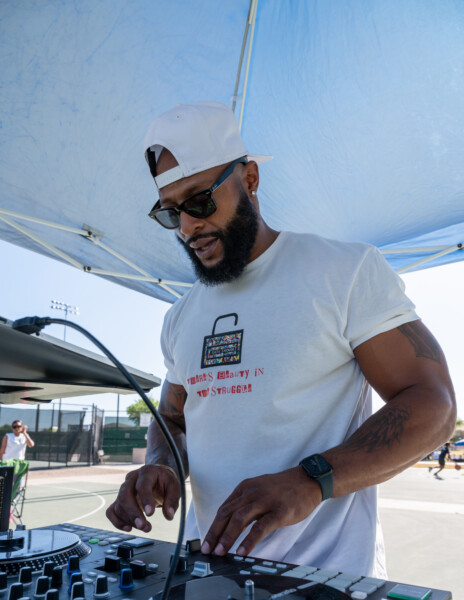
“(Football) was my therapy, it was a good way to get out aggression,” Elliott said. “I was praised for that aggression … I was able to get out all the tears because while I was sweating, I was crying.”
That hurt, aggression and sadness followed him for years — until he was injured during a professional arena football game for the Corpus Christi Fury in Texas.
“I got blindsided,” he said. “Normally, I would have seen that, but I didn’t. After that happened and I got hurt, I was sitting and healing and I was just done. The drive just wasn’t there.”
Elliott said the injury forced him to focus inward and led him to begin working on his mental health and address some unhealthy habits society often associates with masculinity he fell victim to in his younger years.
“As a man, to say you have something going on with you, (you’re told that) is not what men do,” Elliott said. “We take it on the chin. We put our head up, shoulders back, don’t drop a tear. Don’t cry because men don’t cry.”
He wanted to change that for himself, especially as a father.
“The only way change has ever come … is because someone had to go against the grain of what everyone else says, and that’s hard,” Elliott said. “I had to do it in my life because I didn’t want my children or my family to repeat things (from my childhood). I needed to show my children that it’s okay to not be okay. It’s okay to cry, it’s okay to have emotion.”
Addressing suicide and mental health in youth
As Elliott worked on himself, he also saw a growing need to also help youth in the community. This led him to create Safe House.
“It’s a safe place, a safe space for kids to come and be themselves, whoever that is,” he said.
Safe House began in October as a small gathering and grows each month. The monthly meet-up fosters a positive environment for 14- to 19-year-olds to participate in healthy activities and discussions about the troubles teens face these days. Elliott’s chief concern is to address mental health and suicide awareness in teens. He cited six known suicide deaths among Maricopa teens since 2022.
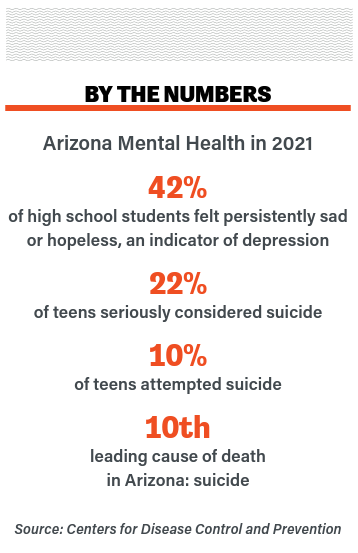 “While the adults are (busy), what are the kids up to?” he said. “What are they watching? What are we teaching them? Safe House came about because of teen suicides in our city.”
“While the adults are (busy), what are the kids up to?” he said. “What are they watching? What are we teaching them? Safe House came about because of teen suicides in our city.”
Earlier this year, those problems hit home for Elliott, whose son, Ajani, 20, took his own life in January.
Elliott remains significantly impacted by the memory of Ajani’s struggles.
As Elliott explained, in the wake of such a tragedy, there are so many questions left unanswered and it’s easy to heap the blame on himself, regardless of whether it’s warranted.
“It’s so difficult to not feel like you’ve failed,” Elliott said. “As a parent, I feel I failed as a father because I failed to recognize my own son’s screams. That is my reality, I go back and forth every day.”
No parent should ever have to bury their child and living with the pain of losing Ajani was something Elliott didn’t want other parents to experience.
“Safe House is completely different now because I see how these kids need some help,” he said.
Helping youngsters find their way
Mental health is a difficult topic to broach because of the stigma from society. It seems perfectly fine to get help for a physical ailment, but people, especially younger folks, might feel too intimidated to seek out mental help.
Elliott wants to give teens the space they need to explore these issues and get help.
“They have emotion, but they often don’t know what they’re feeling and can’t interpret it,” Elliott said.
As part of his effort, Elliott has formed a partnership with therapists from Northern Lights Therapy to assist in discussions and provide counseling for youth who require additional services.
“I was invited to his first Safe House event, which was cool to see,” Reinhold said. “He wants to help youth feel safe, to feel heard and to feel like they matter. That’s the same thing therapists do but our role is limited. Kids still need a place where they can go and feel like they belong. And that’s important because there’s not a lot of resources for all kids to do that. Home or school aren’t always the most supportive environments for all teens. This gives them an option.”
Reinhold spoke of one shy 15-year-old dropped off by his mother.
“She said he had some delays and had trouble making friends at school,” Reinhold said. “She told me that she just wanted him to have fun and just hoped that he could build some kind of connection with someone. And he did. He befriended another boy over a game of Uno. To watch him walk out smiling and feeling accepted for himself, that was a cool thing to see.”
Safe House continues to grow with more events and Elliott revels in the reciprocal healing experienced during the monthly events.
“These kids, I think they’re just as much help for me as (Safe House) is for them,” he said.
This content was previously published in the June issue of InMaricopa Magazine.

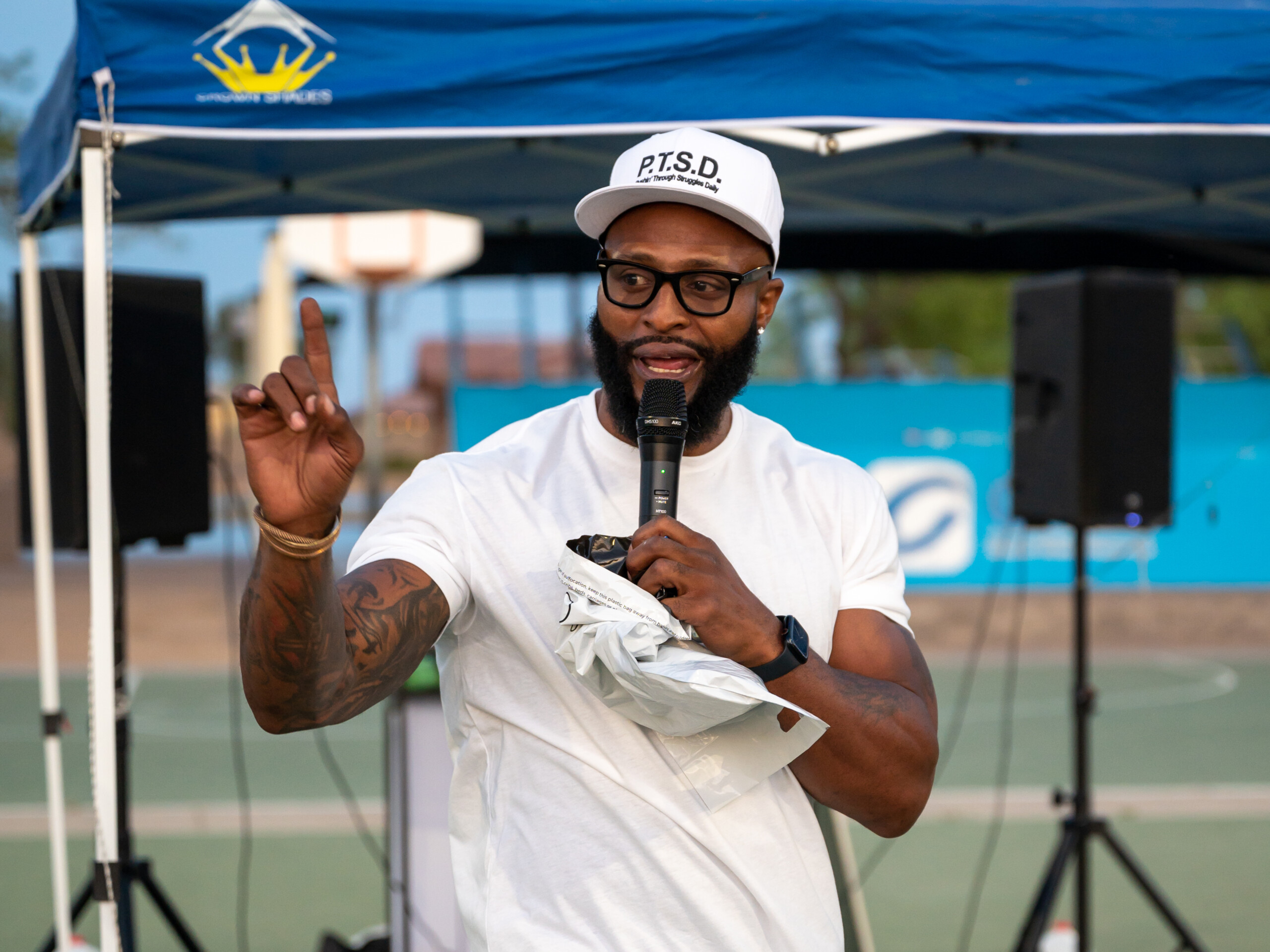
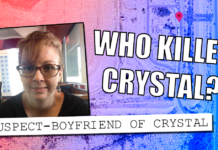

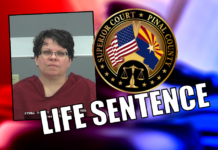
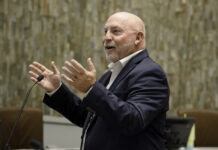
![MHS G.O.A.T. a ‘rookie sleeper’ in NFL draft Arizona Wildcats wide receiver Jacob Cowing speaks to the press after a practice Aug. 11, 2023. [Bryan Mordt]](https://www.inmaricopa.com/wp-content/uploads/2024/04/cowing-overlay-3-218x150.png)



![Maricopa’s ‘TikTok Rizz Party,’ explained One of several flyers for a "TikTok rizz party" is taped to a door in the Maricopa Business Center along Honeycutt Road on April 23, 2024. [Monica D. Spencer]](https://www.inmaricopa.com/wp-content/uploads/2024/04/spencer-042324-tiktok-rizz-party-flyer-web-218x150.jpg)


![Alleged car thief released without charges Phoenix police stop a stolen vehicle on April 20, 2024. [Facebook]](https://www.inmaricopa.com/wp-content/uploads/2024/04/IMG_5040-218x150.jpg)




